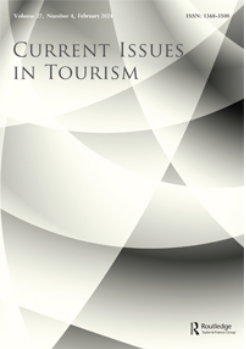“方便面危机”:了解中国某旅游目的地游客集体环境不负责任行为的游客和公众情绪
IF 4.6
3区 管理学
Q1 HOSPITALITY, LEISURE, SPORT & TOURISM
引用次数: 0
摘要
摘要有限的研究考察了游客和公众对游客环境不负责任行为的看法。本研究使用Python挖掘和分析在线旅行社网站和社交网站的在线评论,以了解游客环境不负责任行为的具体事件,即中国老君山“方便面危机”,该事件引发了广泛的网络讨论。研究发现:(1)基于事件系统理论,在线旅行社网站与社交网站“方便面危机”的演化机制存在差异。(2)关键词、语义共现和视觉语义关联网络的结果显示,在线旅行社网站的评论主要集中在旅游体验和景点上,游客很少提及自己的行为。相反,社交网站上的评论则集中在指责和寻找原因上。(3)潜狄利克雷分配模型分析表明,旅游者的环境不负责任行为降低了旅游者和公众的积极情绪,增加了消极情绪。本研究从一个全新的视角探讨了与游客集体环境不负责任行为相关的发生机制、游客和公众的态度和情绪。它为未来该领域的学术研究和旅游目的地管理策略提供了见解。关键词:旅游者环境不负责任行为在线旅行社社交网站本质分析事件系统理论披露声明作者未报告潜在利益冲突本研究由国家哲学社会科学规划办公室资助(批准号:19BGL139);海南省教育厅(批准号:Hnjg2021ZD-4)。本文章由计算机程序翻译,如有差异,请以英文原文为准。
‘Instant Noodle Crisis’: understanding tourist and public sentiments towards collective tourist environmentally irresponsible behaviour in a tourist destination in China
ABSTRACTLimited studies have examined tourist and public sentiments towards tourists’ environmentally irresponsible behaviour. This study used Python to mine and analyze online reviews from online travel agency websites and social networking sites to comprehend a specific event of tourists’ environmentally irresponsible behaviour, the Laojun Mountain ‘Instant Noodle Crisis’ in China, which has triggered widespread online discussion. The findings are as follows: (1) Based on the event system theory, it showed that the evolutionary mechanisms of ‘Instant Noodle Crisis’ differ between online travel agency websites and social networking sites. (2) The results from keywords, semantic co-occurrence, and visual semantic association networks revealed that reviews on online travel agency websites focused on travel experiences and sights, with tourists rarely mentioned their own behaviour. In contrast, reviews on social networking sites concentrated on blame-assigning and cause-seeking. (3) Latent Dirichlet Allocations model analysis demonstrated that tourists’ environmentally irresponsible behaviour decreased positive feelings and increased negative emotions among tourists and the public. This study explored the occurrence mechanisms, tourist and public attitudes and emotions, related to collective tourists’ environmentally irresponsible behaviour from a novel perspective. It offer insights for future academic research in the field and tourism destination management strategies.KEYWORDS: Tourist environmentally irresponsible behaviouronline travel agenciessocial networking sitessentiment analysisevent system theory Disclosure statementNo potential conflict of interest was reported by the author(s).Additional informationFundingThis research is supported by the National Planning Office of Philosophy and Social Sciences of China (Grant Number: 19BGL139); the Education Department of Hainan Province (Grant Number: Hnjg2021ZD-4).
求助全文
通过发布文献求助,成功后即可免费获取论文全文。
去求助
来源期刊

Current Issues in Tourism
HOSPITALITY, LEISURE, SPORT & TOURISM-
CiteScore
15.50
自引率
10.00%
发文量
230
期刊介绍:
Journal metrics are valuable for readers and authors in selecting a publication venue. However, it's crucial to understand that relying on any single metric provides only a partial perspective on a journal's quality and impact. Recognizing the limitations of each metric is essential, and they should never be considered in isolation. Instead, metrics should complement qualitative reviews, serving as a supportive tool rather than a replacement. This approach ensures a more comprehensive evaluation of a journal's overall quality and significance, as exemplified in Current Issues in Tourism.
 求助内容:
求助内容: 应助结果提醒方式:
应助结果提醒方式:


